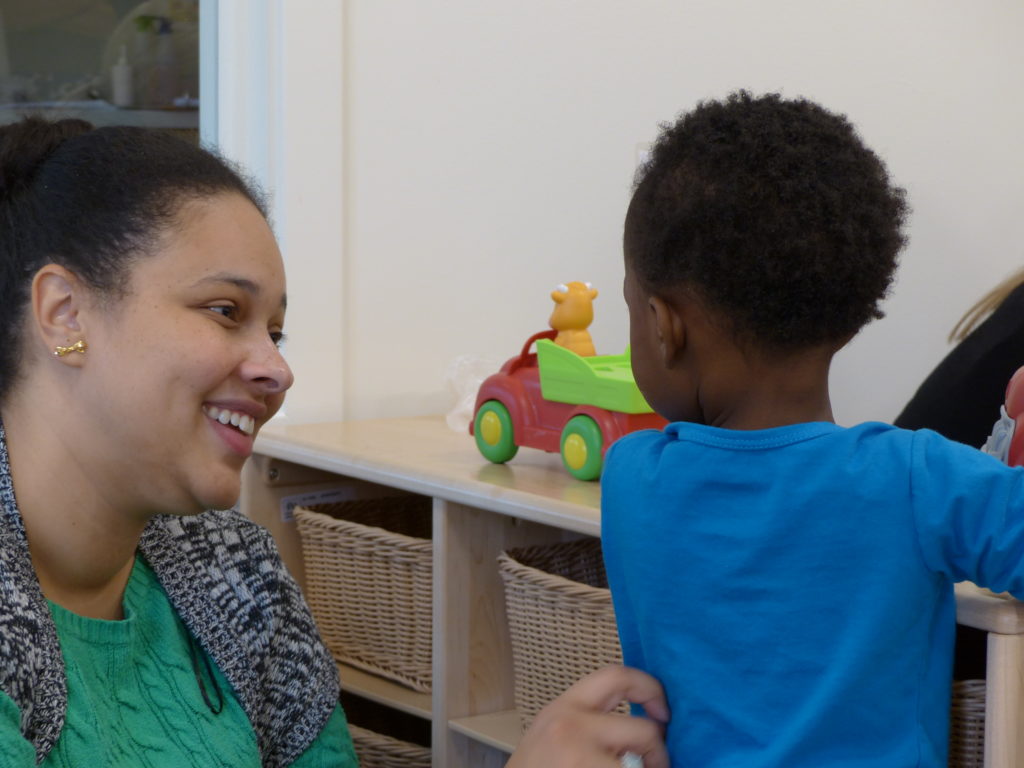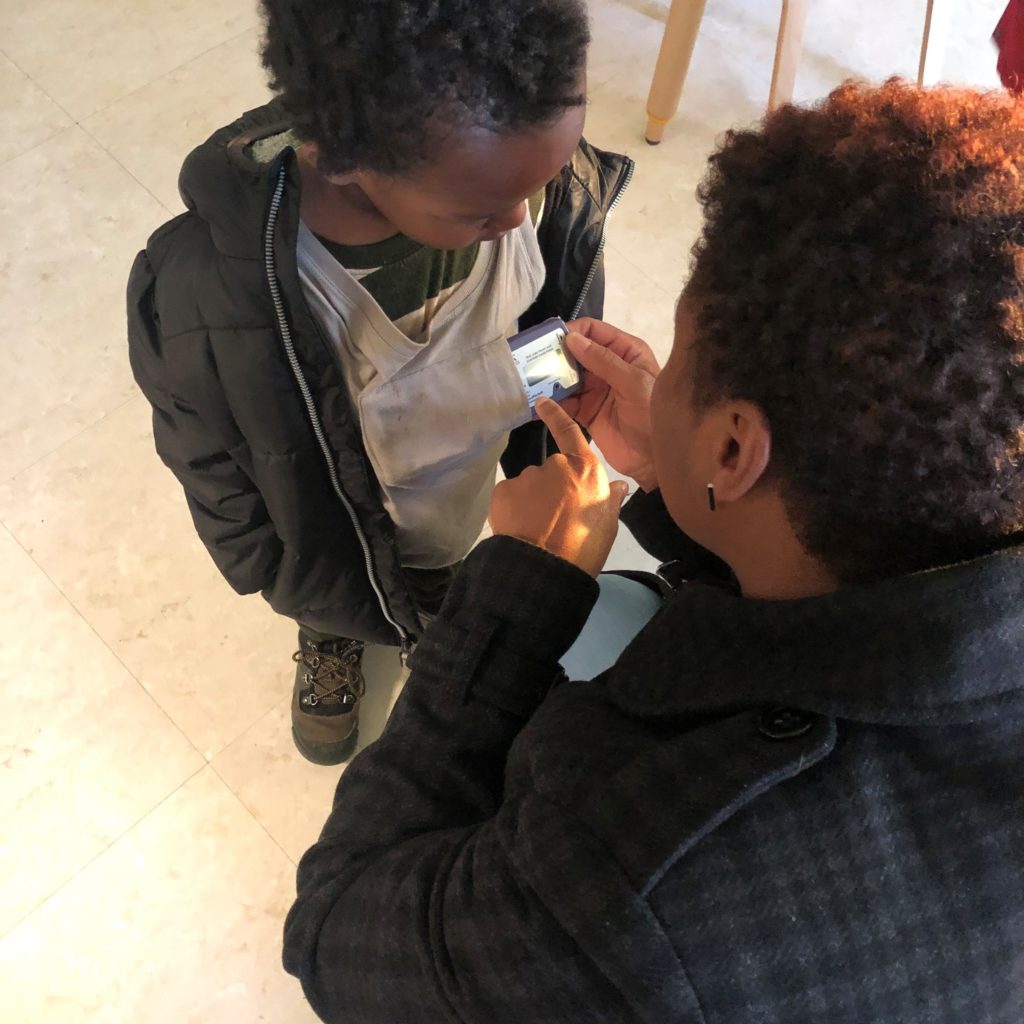How Quantifying Vocabularies Helps Bright Beginnings Improve Literacy in Children
 We tend to measure literacy in long-term outcomes: advancing in school, graduating high school or college, getting a good job, breaking a cycle of poverty, and so on.
We tend to measure literacy in long-term outcomes: advancing in school, graduating high school or college, getting a good job, breaking a cycle of poverty, and so on.
But how can we better measure a child’s progress on literacy skills in the short term?
That’s a question Junior League of Washington (JLW) community partner Bright Beginnings is trying to answer with its LENA Grow technology.
Bright Beginnings, founded by JLW volunteers in 1990, operates early childhood and family learning centers for children and families experiencing homelessness in Washington, DC. To give children, from birth to age five, the best chance to succeed in life, Bright Beginnings provides both education to the children and support to the parents to help them become self-sufficient.
JLW learned more about Bright Beginnings’ LENA technology from Shaquita Tillman, Director of Education, Dr. Anthony Sims, Director of Organizational Learning, and Darin Allen, Director of Development and External Affairs at Bright Beginnings.
For young children, verbal interactions, whether that’s at home or at school, lay the primary groundwork for basic literacy skills and ultimately higher-level thinking skills that help them succeed in school and life. “Early childhood research indicates an astounding discrepancy in the vocabulary development between children of color from high-poverty backgrounds in comparison to their white peers. Bright Beginnings,” Bright Beginnings staff said. 
To quantify the daily interactions of Bright Beginnings students and their teachers and/or parents, “LENA provides a data-driven innovation to monitor adult-child verbal interactions as well as a means of objectively monitoring progress in the number of words children are using,” according to Bright Beginnings.
Simply put, LENA helps Bright Beginnings understand what its students’ baseline literacy skills are, what they are hearing and learning each day, and how they are growing and changing. With this knowledge, Bright Beginnings can appropriately tailor its own educational programming and can coach parents to make changes to improve a child’s language development.
Bright Beginnings pre-kindergarten students wear the LENA, which stands for Language Environment Analysis, device once or twice a week, in a specially designed vest that they affectionately call “Super Hero” clothing. The digital recordings are then uploaded to the LENA cloud without any human review, to protect the privacy of students and families. A computerized analysis of the file aggregates adult-child interactions and the children’s word count (but not the content of conversation). The data is analyzed and provided to both teachers and parents.
Bright Beginnings uses the LENA technology both in its school-based program at its educational centers as well as its home-based program, which offers Early Head Start services to children and their families in their home environment (many of whom are awaiting space in the wait-listed educational centers). For the school-based program, the teachers use the data to facilitate more intentional lesson planning as it relates to literacy and parents receive valuable information about how their children are engaging in conversation with adults during their normal classroom experience. For the home-based program, LENA provides parents with a “very accessible” tool to gather information related to their child’s vocabulary, as well as reliable measures that show how their conversations are supporting a child’s development.
This is especially important for the families Bright Beginnings serves. “Lower levels of parents’ education and disrupted educational trajectories are common characteristics associated with families experiencing intergenerational poverty and homelessness. For children from the most vulnerable families, LENA provides a vital tool for educators and parents to monitor and improve practices to facilitate language-rich environments,” Bright Beginnings said. Simply
The end goal, says Bright Beginnings, is “to increase educators’ and parents’ conversational practices with students to promote language development.” Specifically, “we hope to see an increase in conversational turns between adult educators/parents and students, as well as increased word use by students.”
JLW members — as well as members of the public — can support Bright Beginnings’ literacy efforts through LENA or otherwise. “One effective support is partnering of volunteers with individual families for an immediate time period (five-six months) to engage with parent partners on a regular basis to help them acquire and integrate quality literacy skills with their children. Once… volunteers receive the necessary training to effectively work as partners with Bright Beginnings families, they could provide a great resource for families,” Bright Beginnings said.
Since its role in founding Bright Beginnings, JLW continues to support the nonprofit as part of its focus on improving literacy in Washington, DC. JLW’s financial support of Bright Beginnings persists to this day, with League volunteers spearheading the annual Bright Beginnings 5K, a key component of Bright Beginnings’ fundraising. In addition, JLW has supported Bright Beginnings with more than $50,000 in grants over the last 30 years.JLW volunteers host several literacy nights throughout the year for Bright Beginnings children and families.
If you are interested in supporting Bright Beginnings as a volunteer and you are not a member of JLW, visit here.
Read more about Bright Beginnings’ LENA program in The Washington Post.


